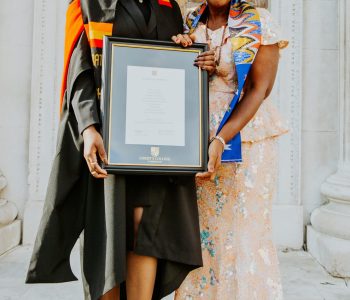 In The News
In The News
 In The News
In The News
 In The News
In The News
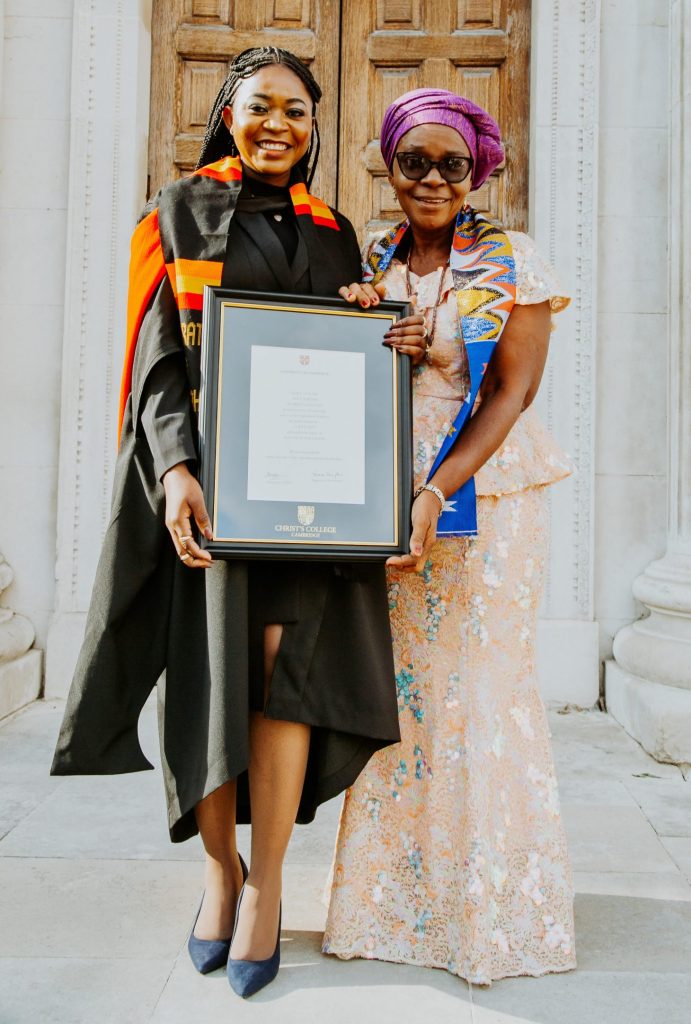
A Message from Alice to be shared with the FWE Community:
“I am happy to inform you that on the 21st of July, I graduated from the University of Cambridge.Your community and support were my strengths! I am sincerely graduate for all the mentorship, opportunities, and grant.
It’s been an intimidating journey for me, but the end result has been rewarding. I’d like to share a photo of my mum and me on graduation day.”
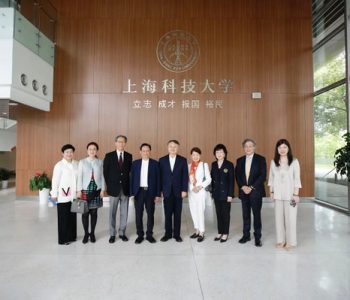 In The News
In The News
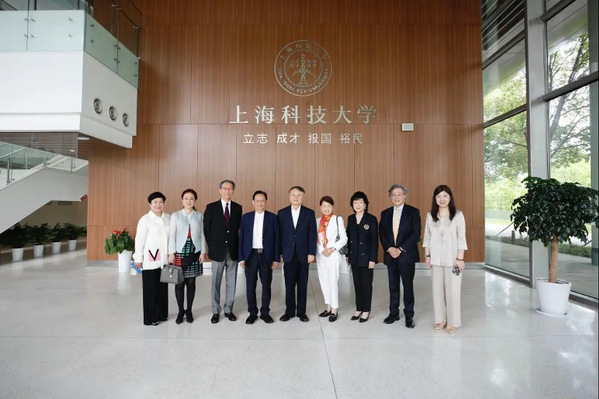
On May 30, a delegation from the Forum for World Education (FWE) visited ShanghaiTech University, led by Cheng Yan Davis, Co-founder and President of FWE. The delegation was received by President Jiang Mianheng, Vice President Jiang Ge, and Vice Provost Yu Jingyi, and others.
President Jiang extended a warm welcome to the delegation and introduced the development history and characteristics of ShanghaiTech, as well as its experience in cultivating innovative talents and promoting technology transfer. He expressed the hope that both sides could strengthen cooperation in the future. Before the meeting, Jiang Ge accompanied the guests to visit the Shanghai Synchrotron Radiation Facility and Soft X-ray Free Electron Laser Facility. They enjoyed the lively demonstrations and were impressed by the scientific achievements made in these cutting-edge facilities. The delegation also visited schools and institutes such as SIAIS, the iHuman Institute, BME, SEM, SCA, and learned about the construction plans for the Center for Future Medicine.
In the afternoon, the guests and ShanghaiTech spinoff leaders held an Entrepreneurship Seminar at ShanghaiTech SPACE (incubator). The founders/CEOs of CorrectSequence, MOFenerg, Stereye, DGene and Asiflyer Biotechnology briefly introduced the milestones, financing scale, and product highlights of their companies. Following that, the two sides shared their entrepreneurial experience and discussed potential partnership opportunities. Finally, the delegation visited SIST, where Yu Jingyi accompanied the tour and made introductions.
The FWE delegation brought together 25 industry luminaries including Edith Shih, Ani Kharajian, William Cheung, Li Ping, and Pan Jun, members of the Forum’s Steering Committee, as well as Ping Tse, Founder of Sino Biopharmaceutical and Senior Vice Chairman of Charoen Pokphand Group (CP Group), Li Yi, Chairman of Innovation Times Group, and several FWE Young Leaders. This visit to ShanghaiTech not only deepened their understanding of the university but also established a bridge of communication between ShanghaiTech and international education and investment professionals.
The Forum for World Education (FWE) is a non-profit worldwide organization headquartered in Cambridge, Massachusetts, with operations in major cities throughout the world. Its mission is “to transform education in answer to the skills and knowledge requirements of current and future global society, its economic growth, societal progress and sustainability.”
Link: https://www.shanghaitech.edu.cn/eng/2023/0608/c1260a1078107/page.htm
 In The News
In The News
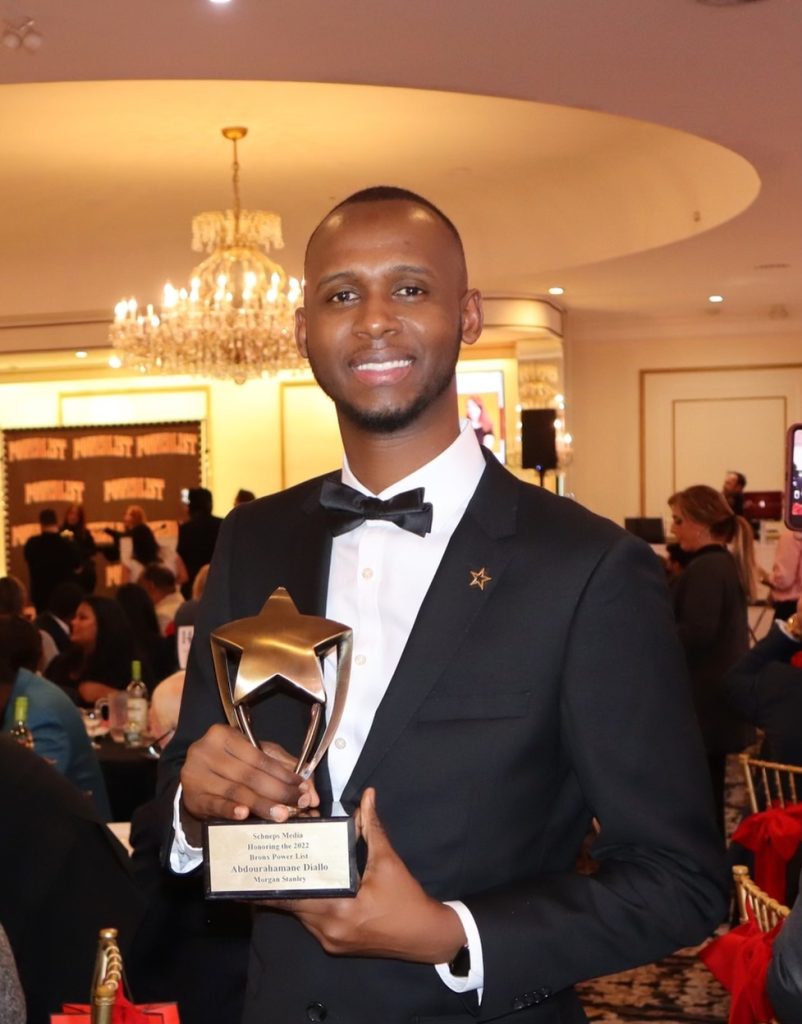
Diallo has been recognized as one of the Bronx’s most influential and powerful people. The Bronx Power
List recognizes your ongoing commitment, impact, and influence as one of the borough’s most
influential movers and shakers.
Diallo is a trained economist and geopolitical strategist. He currently works as a geopolitical and
macroeconomic scenario designer for one of Wall Street’s most prestigious investment banks. Diallo
previously worked for BlackRock Inc., the US Department of Commerce, JP Morgan Chase, the US
Department of Census, and Aster Impact.
Diallo has a bachelor’s degree in finance and investment from Baruch College as well as a Leadership
and Strategy Impact Certificate from Columbia University. Before attending Baruch, he studied law for
two years at La Source University and political science for another two years at John Jay College. Diallo is
the first Guinean American and Baruch student to be awarded a Schwarzman Scholars fellowship at
Tsinghua University, one of the most competitive leadership programs in the twenty-first century, where
he earned a Master of Science in economics with a focus on poverty alleviation.
Diallo is a distinguished public servant with over ten years of demonstrated leadership experience. A
leader who uses his power and resources to help others He is the founder and chairman of Guineans
Succeeding in America (GSA), an umbrella organization that now includes the Guinean Students
Association and the Guinean Graduates. GSA currently reaches thousands of people, assisting hundreds
of students and young professionals in obtaining internships and full-time jobs through mentorship and
professional development workshops. He is the founder of the Guinean New Generation Movement
(GNGM), which seeks to empower the Guinean community through social justice, civic engagement, and
economic development. Diallo also co-founded and served as the African Empowerment Project’s
director of community outreach in New York City.
During the COVID-19 pandemic, Diallo mobilized GSA resources and coordinated online tutoring sessions
for students, assisting hundreds of people in filing for unemployment while spending hours on the
ground weekly distributing personal protective equipment and food to thousands of families in the
community. GSA was presented with an award by then-Brooklyn Borough President Eric Adams, the
current Mayor of New York.
Driven by his keen desire to find solutions to the challenges facing his community. Diallo took a bold step
and ran for the 16th New York City Council District in 2021. His campaign platform advocated for a safer
and more prosperous Bronx. As an African immigrant, he wished to advance the African community.
Despite not being elected, Diallo set the tone and paved the way for future generations of young
Africans.
Prior to running for city council, Diallo was the general secretary of Bronx Borough President Ruben Diaz
Jr.’s African Advisory Council, where he played a role in the council’s advocacy efforts to address the
needs of the African community and bring progress. In 2018, he was appointed to the Bronx Community
Board 3. Fast forward to 2020, when Diallo was elected to the Bronx Democratic Party County
Committee for District 79th to continue his tireless efforts and commitment to the Bronx community.
Diallo immigrated to New York from Guinea-Conakry, West Africa, in order to maximize his potential.
Since then, he has strived for the stars while bringing his community with him. Serving others is his way
of life, and he lives by the maxim, “Rather live one day and change 100 lives than live 100 years without
helping a single soul.” He speaks five languages, plays soccer, and has a red belt in taekwondo.
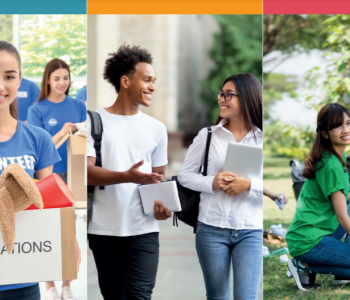 In The News
In The News
Programme for International Student Assessment
Veronica Boix Mansilla
Andreas Schleicher
© OECD 2022
Introduction
Globalisation and digitalisation have connected people, cities, countries and continents in ways
that vastly increase our individual and collective potential. But the same forces have also made the
world more volatile, more complex, more uncertain and more ambiguous. The world is witnessing
a growing disconnect between an infinite growth imperative and the finite resources and delicate
ecosystems of our planet; between the financial economy and the real economy; between the
wealthy and the poor; between the concept of gross domestic product and the well-being of people;
between technology and social needs; and between governance and the perceived voicelessness
of people.
No one should hold education responsible for all of this but neither should anyone underestimate
the role that people’s knowledge, skills, attitudes and values play in social and economic
development and in shaping the cultural context.
In today’s world, education is no longer just about teaching students something but about helping
them develop a reliable compass and the tools to confidently navigate through an increasingly
complex, volatile and uncertain world. Success in education today is about identity, it is about
agency and it is about purpose. It is about building curiosity – opening minds. It is about compassion
– opening hearts. And it is about courage – mobilising our cognitive, social and emotional resources
to take action. These are also our best weapons against the biggest threats of our times: ignorance
– the closed mind; hate – the closed heart; and fear – the enemy of agency.
Things that are easy to teach and test have become easy to digitise and automate. We know how to
educate learners who are good at repeating what we tell them. But in this age of acceleration and
artificial intelligence, we need to think harder about what makes us human.
Algorithms that sort us into groups of like-minded individuals create social media echo chambers
that amplify our views and insulate us from opposing arguments that may alter our beliefs. These
virtual bubbles homogenise opinions and polarise our societies; and they can have a significant
– and adverse – impact on democratic processes. Those algorithms are not a design flaw; it is how
social media works. There is a scarcity of attention but an abundance of information. We are living
in a digital bazaar where anything that is not built for the network age is cracking apart under its
pressure.
The conventional approach in school is to break problems down into manageable bits and pieces
and then to teach students how to solve these bits and pieces. But modern societies create value by
synthesising different fields of knowledge and making connections between ideas that previously
seemed unrelated. Innovation comes from connecting the dots.
In today’s schools, students typically learn individually and at the end of the school year, we certify
their individual achievements. But the more interdependent the world becomes, the more we
need great collaborators and orchestrators. We can see during this pandemic how the well-being
of countries depends increasingly on people’s capacity to take collective action. Schools need to
help students learn to be autonomous in their thinking and aware of the pluralism of modern living.
This is important. At work, at home and in the community, people will need a broad understanding
of how others live in different cultures and traditions, and how others think, whether as scientists
or as artists.
The foundation for this doesn’t entirely develop naturally. We are all born with “bonding social
capital”, a sense of belonging to our family or other people with shared experiences, common
purposes or pursuits. But it requires deliberate and continuous efforts to create the kind of “bridging
social capital” through which we can share experiences, ideas and innovation with others, and
increase our radius of trust to strangers and institutions.
These considerations led PISA, the global standard for measuring the quality of educational
outcomes, to include ‘global competence’ in its latest evaluation of 66 school systems. To do well on
this assessment, students had to demonstrate that they can combine knowledge about the world
with critical reasoning, and that they were able to adapt their behaviour and communication to
interact with individuals from different traditions and cultures.
It is perhaps no surprise that countries that generally do well in education also tended to show
higher levels of global competence: students in Singapore and Canada who do well on the PISA
subject matter tests also came out on top in global competence. What is more interesting, however,
is that a country like Colombia where students often struggle with reading, math and science tasks
does far better on global competence than predicted by its reading, math and science scores.
Also Scotland, Spain, Israel, Panama, Greece, Croatia, Costa Rica and Morocco did better than
expected. In turn, students in Korea and the Russian Federation did less well than predicted. In other
words, global competence is not an automatic by-product of academic learning, it is something
that needs to be nurtured.
But how can this be done effectively? How do we design curricula, instruction, assessments, and
learning environments that develop students’ global competence?
This publication offers research-informed and actionable pedagogical principles that policy
makers, leaders, and educators can use to support equitable and effective global and intercultural
competence education. It includes case studies to illustrate these guiding principles in
real-life contexts like classrooms, museums, learning centres, cultural exchange programmes, and
digital platforms. Around the world today, teachers like Marissa (Box 1) are embracing the shifting
demands of their profession.
Download the Report – Big Picture Thinking_how to educate the whole person for an interconnected world (PDF)
Read the Full Report – Big Picture Thinking: How to educate the whole person for an interconnected world by OECD – ISSU
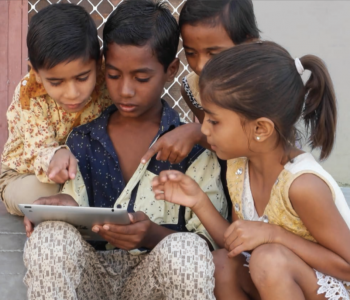 In The News
In The News
This report brings together 45 of the education continuity stories that were jointly documented by the OECD, the World Bank, Harvard’s Global Education Innovation Initiative and HundrED during the first wave of school closures related to the COVID-19 pandemic. It covers a variety of different examples on how governments and non-governmental organisations quickly responded to school closures to implement a strategy for learners around the world to continue to study. While often based on the use of digital solutions, those solutions target specific solutions aimed at academic learning, socio-emotional support, teacher professional development, etc. The book covers examples from low, middle and high income countries on all continents and draws some lessons of these fast-paced responses to reimagine a post-pandemic education across the world.
OECD-WB How Learning Continued during COVID – edu-2022-61-en – Launch version
24 Jan 2022 384 pages English
Authors: OECD and The World Bank Editors: Stéphan Vincent-Lancrin, Cristóbal Cobo Romaní and Fernando Reimers
Vincent-Lancrin, S., C. Cobo Romaní and F. Reimers (eds.) (2022), How Learning Continued during the COVID-19 Pandemic: Global Lessons from Initiatives to Support Learners and Teachers, OECD Publishing, Paris, https://doi.org/10.1787/bbeca162-en.
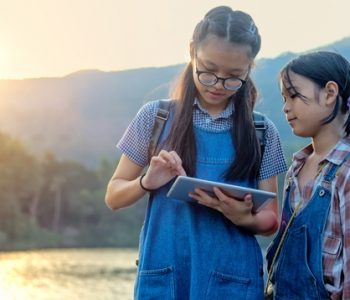 In The News
In The News
(As one of the main founding organisations, Fazheng Group presents these articles: https://en.unesco.org/themes/ict-education/mobile-learning/fazheng/case-studies)
There are two types of case study:
The following were selected for inclusion in the publication and will be published later this year both on and offline.
Download summaries of top-down case studies
Enhancing social inclusion through innovative mobile learning in Uruguay
Plan Ceibal, Uruguay
Establishing a system for developing digitally mature schools in Croatia
e-Schools: Establishing a System for Developing Digitally Mature Schools, CARNET, Croatia
Classroom revolution through SMART education in the Republic of Korea
SMART Schools, Republic of Korea
Transforming Finnish schools to mobile learning environments with a competence-based core curriculum
Finnish National Agency for Education, Finland
Improving quality and relevance of education through mobile learning
Ministry of Education, Rwanda
Forthcoming
Download summaries of bottom-up case studies
Mobile learning for individualized education in China
Shuren Jingrui Primary School, China
Mobile Learning as a long-term institutional innovation strategy in Spain
CEIP Ponte dos Brozos, Spain
Mobile learning as a catalyst to global citizenship education in China
Beijing Royal School, People’s Republic of China
Empowering students to become agents of social transformation through mobile learning in Brazil
Colégio Miguel de Cervantes, Brazil
Developing and delivering a successful technology for learning strategy in the UK
Denbigh High School, Luton, United Kingdom of Great Britain and Northern Ireland
Anytime, anywhere learning for improved education results in Russia
Harmony School, Russia
Mobile technologies for lifewide learning in schools in Israel
Amal Shevach Mofet High School, Israel
Using technology-assisted project based learning to promote 21st century skills in Portugal
Colégio Monte Flor, Portugal
 In The News
In The News
Calling for a New Approach to Building 21st Workforces: It’s About Skills Development, Not Education Attainment, Argue Experts Convened by the Forum for World Education
As wealthy and developing nations alike seek to create workforces geared to 21st century opportunities and challenges, they are devoting intense effort to ensuring that students spend more years in school and earn higher-level degrees. But that emphasis may be misplaced, according to new analyses of the Program for International Assessment of Adult Competencies (PIAAC), the world’s largest skills assessment of adults, and other research.
Findings from PIAAC, administered by the Organisation for Economic Cooperation and Development (OECD) suggest that educational attainment does not necessarily correlate with skills development. Instead, to provide pathways out of poverty and build competitive economies, nations must focus on instilling foundational literacy, numeracy and problem-solving skills. For many students, intensive career and technical education (CTE) may provide the best hope for learning and applying 21st century skills in a constantly changing world.
Those were some of the key takeaways from a recent webinar hosted by the Forum for World Education (FWE), a global nonprofit working to catalyze the transformation of education systems by creating a partnership between business and thought leaders.
“Research has shown that higher-order skills rely on adequate levels of foundational skills that include literacy and numeracy,” said Irwin Kirsch, Director of the Centers for Global Assessment & Research on Human Capital and Education at Educational Testing Service. “If societies want employees who can learn independently and efficiently problem-solve in tech-intensive environments, they’ll need workers and citizens with these skills. The growing divergence between educational attainment and skills in PIAAC data raises critical questions about policies focused on educational credentials without similar consideration of skills development.”
Joining Kirsch, the moderator, on the panel were:
Among the key findings from their presentations:
Data from PIAAC are providing the first comparable measures over time of literacy and numeracy and revealing changes in the literacy and numeracy proficiency in dozens of countries during the past 20 years, Thorne reported.
The PIAAC results confirm that:
Other analyses underscore that proficiency in key skills rather than educational attainment is driving the world’s more developed and faster-growing economies, Schwerdt reported.
During the past 13 years, the World Bank’s STEP Skills Measurement has created a new window onto skills in developing countries, Valerio reported.
For the world’s poorest young people, targeted CTE may reap the greatest rewards. Padaki described the successes of the Head Held High Foundation’s “Make India Capable” program, a six-month, thousand-hour initiative to transform illiterate young adults in rural villages into skilled professionals in fields such as business process outsourcing.
“We’re still in the discovery phase, but I’d love to figure out how we can collaboratively build something that will work not just in India, but for the world as well,” Padaki said.
The Forum for World Education is a non-profit world organization with its headquarters in Cambridge, Massachusetts and with operations in major cities throughout the world. Its mission is to transform education in answer to the skills and knowledge requirements of current and future global society, its economic growth, societal progress and sustainability. FWE’s founders and steering committee include members of the OECD, former U.S. government officials, global business leaders and scholars from leading universities around the world.
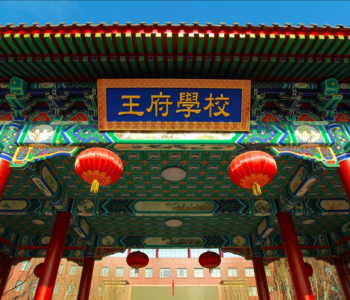 In The News
In The News
On behalf of Fazheng Group/Beijing Royal School, we warmly invite you as our most valued guests to watch the Live Stream of Beijing Royal School 25th Anniversary & 6th Integrate to Innovate International Education Forum, which will be held on Tuesday 9:30am 28th Sep Beijing Time (Monday 21:30 27th Sep EDT).
Please kindly scan any of the two QR codes showed below or click the link here for watching the Live Stream: https://live.media.weibo.com/live/show?id=1022:2320506607bef1b259daf7634857ae86b42031&from=10B9393010&wm=3333_2001&weiboauthoruid=2027748881

We appreciate your time and your long-term support, and we hope you could join us to celebrate this very BIG event for Fazheng Group/Beijing Royal School!
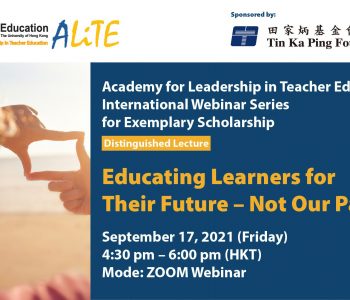 In The News
In The News
The Faculty of Education of the University of Hong Kong (HKU) proudly presents the Distinguished Lecture of the Academy for Leadership in Teacher Education (ALiTE) International Webinar Series for Exemplary Scholarship on “Educating Learners for Their Future – Not Our Past”, sponsored by the Tin Ka Ping Education Fund of the Tin Ka Ping Foundation. The lecture is to be delivered by Professor Andreas Schleicher, Director for Education and Skills & Special Advisor on Education Policy to the Secretary-General, OECD, in September 2021.
In this lecture, Professor Schleicher will discuss what tomorrow’s schools need to do in order to help students think for themselves and join others in work and citizenship, the application of technology and the synthesis of different fields of knowledge, so as to reach a more integrated future.
Members of the media are welcome to cover this online event. Details are as follows:
Date: September 17, 2021 (Friday)
Time: 4:30 pm – 6:00 pm (HKT)
Speaker: Professor Andreas Schleicher, Director for Education and Skills, Special Advisor on Education Policy to the Secretary-General, Organisation for Economic Co-operation and Development (OECD)
Language: English
Mode: ZOOM Webinar
Registration: https://hku.zoom.us/webinar/register/WN_LtmYjpwNR4SIQUxTwIOMgA
Professor Andreas Schleicher has worked for over 20 years with ministers and education leaders around the world to improve quality and equity in education. He initiated and oversees the Programme for International Student Assessment (PISA) and other international instruments that have created a global platform for policy-makers, researchers and educators across nations and cultures to innovate and transform educational policies and practices. Before joining the OECD, he was Director for Analysis at the International Association for Educational Achievement (IEA). For more details, please visit: https://web.edu.hku.hk/event/detail-page/alite-professor-andreas-schleicher
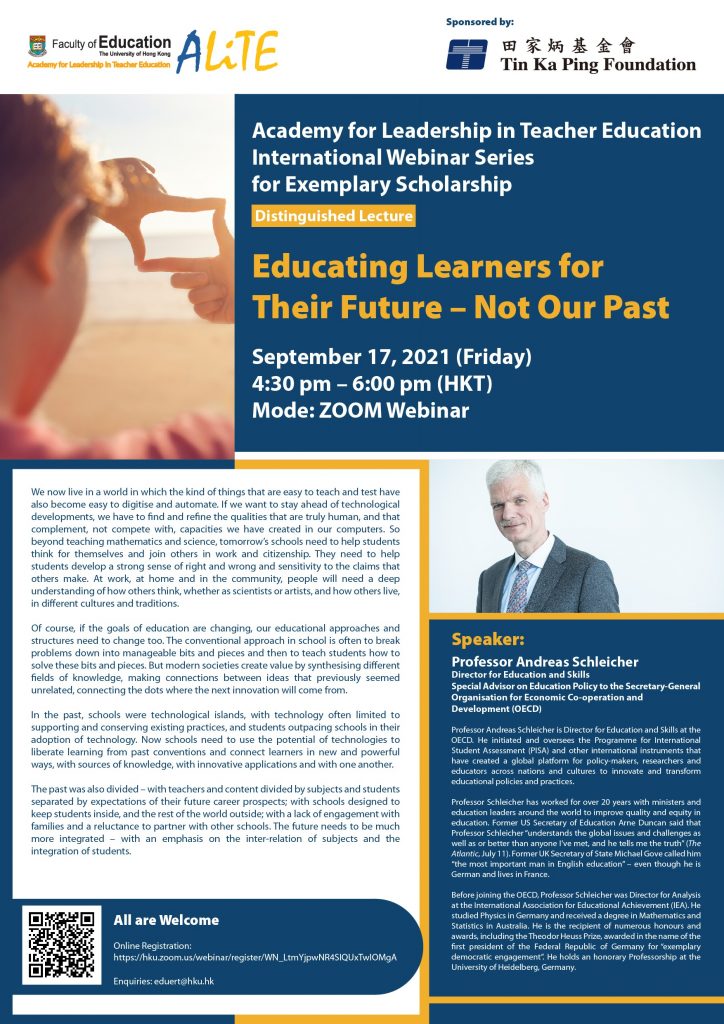
For media enquiries, please contact Ms Emily Cheung, Senior Manager (Development and Communications), Faculty of Education, HKU (Tel.: 3917 4270 / E-mail: [email protected]).
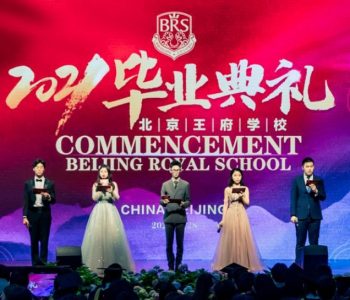 In The News
In The News
On May 28, Beijing Royal School honored the Class of 2021 with a grand commencement ceremony. The ceremony displayed the BRS pride in all graduates who demonstrated amazing tenacity and resilience in challenging times, and received offers from a wide range of prestigious universities and colleges around the world.
[embedyt] https://www.youtube.com/watch?v=PjnGymZvmJc[/embedyt]
The commencement started with an impressive opening in eight languages by student hosts, after which Mr. Mo Jingqi, the Deputy Director of National Institute for Curriculum and Textbook Research, the Deputy Director of National Center for School Curriculum and Textbook Development sent his greetings and congratulations to all the BRS graduates. Mr. Heng Xiaojun, Former Minister-Counselor at the Chinese Embassy in Canada, and Mr. Cen Jianjun, Former Minister-Counselor (Education) at the Chinese Embassy in the United States spoke highly of the graduates’ performance, and congratulated them on a new chapter of their life. They also encouraged the young to be confident, independent, self-disciplined and self-driven as they strive for greater academic success and personal growth in the future, while cherish their love for the country and people.
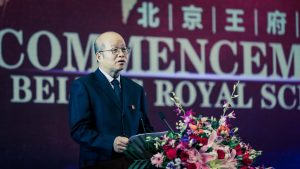
Mr. Mo Jingqi, the Deputy Director of National Institute for Curriculum and Textbook Research
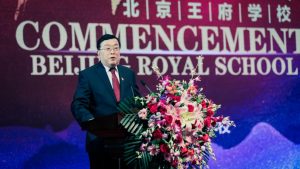 Mr. Heng Xiaojun, Former Minister-Counselor at the Chinese Embassy in Canada
Mr. Heng Xiaojun, Former Minister-Counselor at the Chinese Embassy in Canada
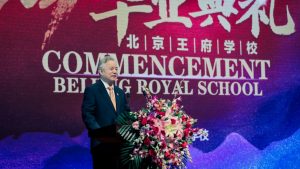 Mr. Cen Jianjun, Former Minister-Counselor (Education) at the Chinese Embassy in the United States
Mr. Cen Jianjun, Former Minister-Counselor (Education) at the Chinese Embassy in the United States
Mr. Liu Kairan, the representative of 2021 graduates, and Dr. Huang Xun, the Deputy of the Institute of Genetics and Developmental Biology at the Chinese Academy of Sciences, also the representative of the family of the graduates respectively spoke on the world view of the young and the world’s expectation for the young. Ms. Lisa Buzenas, Cultural Affairs Officer at the US Embassy in China and the Director of Beijing American Center encouraged the young to actively engage in cross-cultural communications and embrace the dynamic international community. Then, Ms. Fang Yuanyuan, the Class Dean of 2021, congratulated the students on the hard-earned results in the application season, and encouraged them to be upright, truthful and grateful, and to become people who they honor, and proactively assume their responsibilities to the country and society.
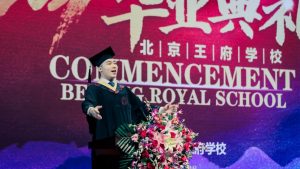 Mr. Liu Kairan, the representative of 2021 graduates
Mr. Liu Kairan, the representative of 2021 graduates
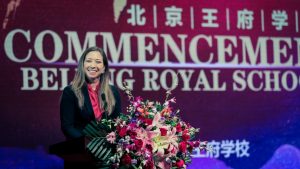 Ms. Lisa Buzenas, Cultural Affairs Officer at the US Embassy in China and the Director of Beijing American Center
Ms. Lisa Buzenas, Cultural Affairs Officer at the US Embassy in China and the Director of Beijing American Center
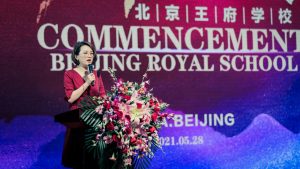 Ms. Fang Yuanyuan, the Class Dean of 2021
Ms. Fang Yuanyuan, the Class Dean of 2021
Mr. Wang Guangfa, Founder and President of Fazheng International Education Group and Chief Principal of Beijing Royal School gave a speech in which he extended a warm welcome to all guests for their attendance, sincere thanks to parents of the graduates for their long support and understanding, and to teachers for their continued commitment. Principal Wang emphasized that the young should hold great ideals and aspirations to contribute to the development of the country and rejuvenation of the Chinese nation. What they need to do is to keep pace with the advancement of science and technology, bear in mind their mission and responsibility for the country and society, and live every day to the fullest.
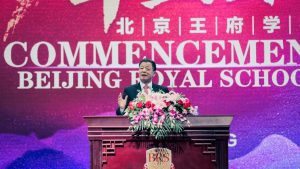 Mr. Wang Guangfa, Founder and President of Fazheng International Education Group and Chief Principal of Beijing Royal School
Mr. Wang Guangfa, Founder and President of Fazheng International Education Group and Chief Principal of Beijing Royal School
The highlight of the ceremony, which has been the most anticipated part of the event, was the gifts display by the Class of 2021. The gifts included a BRS Digital Information Technology Report composed by graduates to optimize the IT workflow and improve efficiency, and a Confucius statue model built with over 1,000 Lego blocks. The gifts not only demonstrated their gratitude to Alma-Mater, but also serve as meaningful birthday gifts as BRS is preparing to celebrate its 25th anniversary later this year.
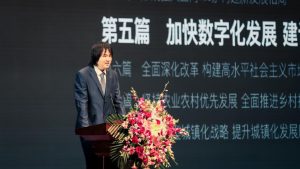
After years of hard work, we are proud to see that the graduates are about to set out on a new journey into an ever-so-splendid world. We cheer for them, not only because they have received offers from the world’s leading universities in US, UK, Canada and Australia, even scholarships from some of the “crème de la crème” institutes such as Berklee College of Music and Parsons School of Design, but also because they have made the breakthroughs in academic research and publications, demonstrated outstanding competencies in international competitions and artistic achievements.
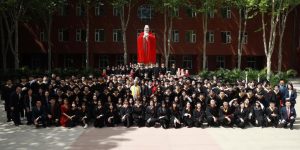
For more information about Beijing Royal School (BRS), please visit BRS Website: https://www.brs.edu.cn/en/